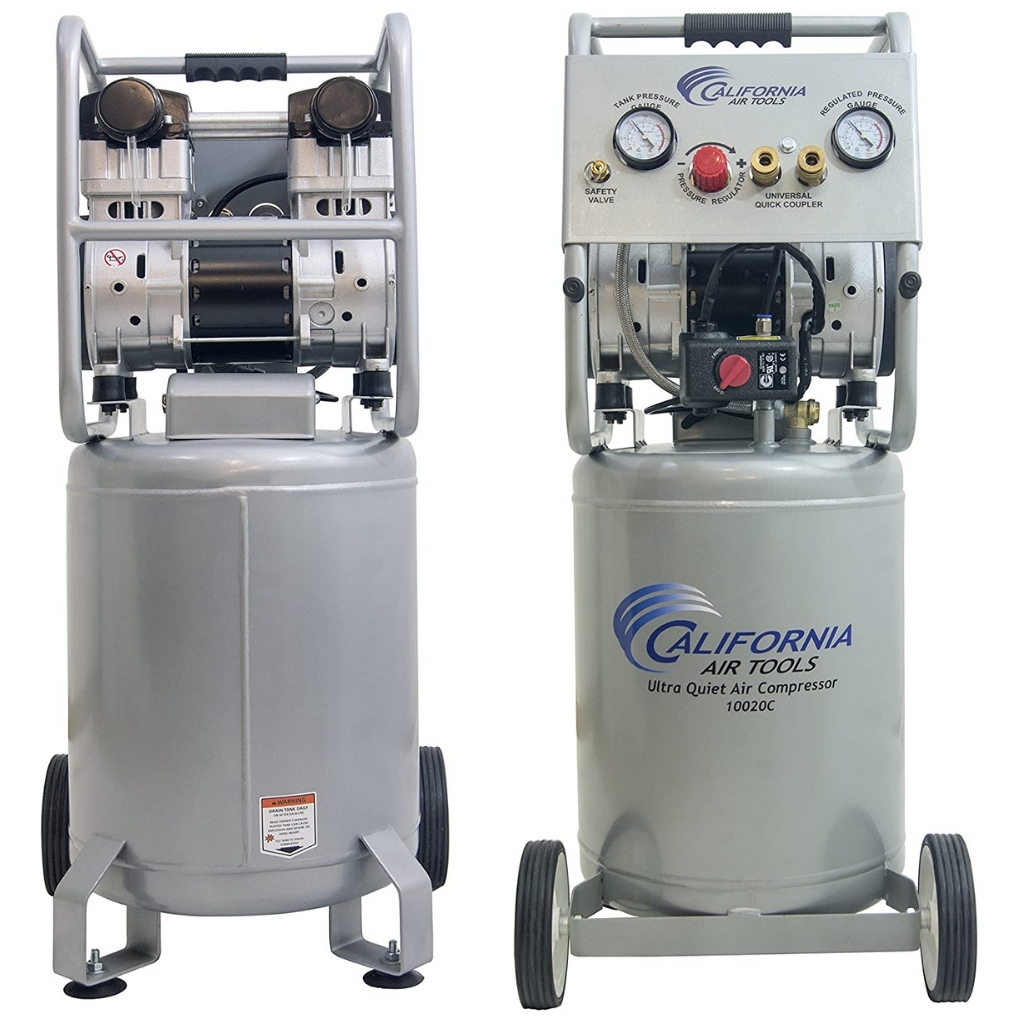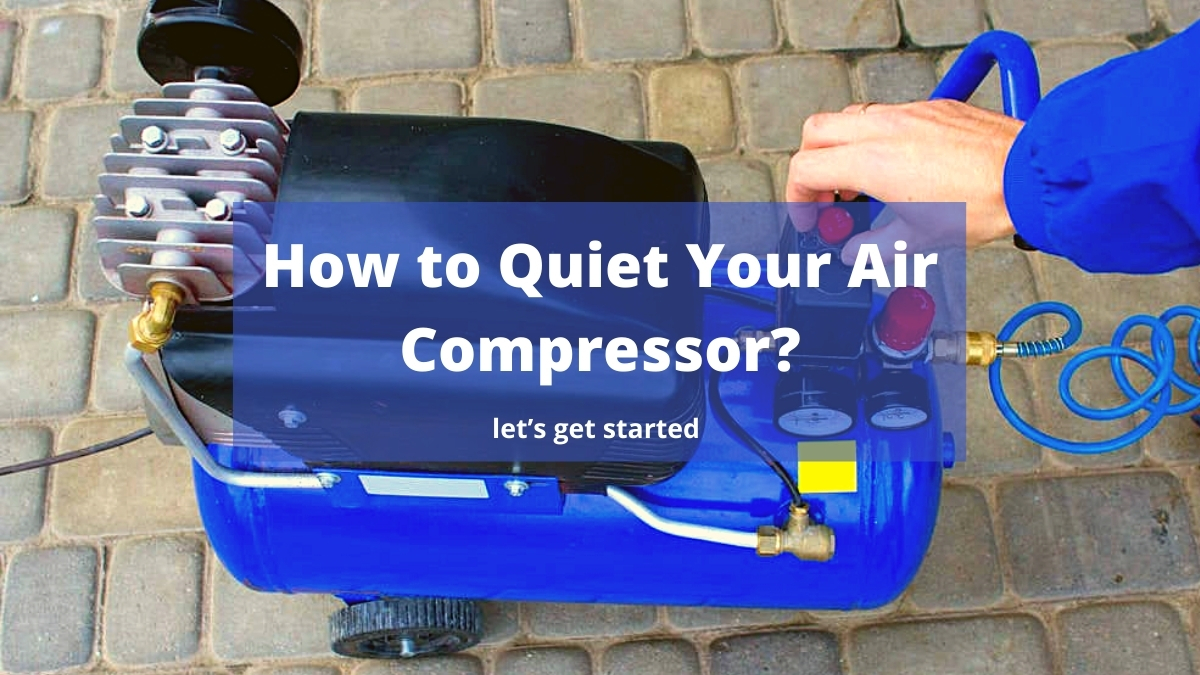An air compressor is a helpful device that helps its consumers in different sorts of situations. Nowadays, air compressors are essential to work even in homes as well. An air compressor is basically a handy machine that is used to compress air. Nowadays air compressors are used for commercial as well as domestic purposes.
However, most air compressors produce a lot of sounds that lead to noise pollution. If you are suffering from noise pollution created by your air compressor then stick to the end. Because in today’s article we will talk about how to make air compressor quiet.
So without wasting our time let’s get started about quieting an air compressor.
How to Make an Air Compressor Quiet
Well, the best way to make an air compressor quiet by:
- Covering the motor
- Wrapping the intake with a muffler or any other object
- Blocking off your air compressor
- Changing the intake position
Try using these if you want air compressor noise reduction. If you think your problem is’t solved now, then wait for a little bit. Keep on reading the article to know more about your air compressor in order to prevent further problems in the future.

First of all, let’s find out the reason why is my air compressor so loud?
Causes for Noise Pollution by an Air Compressor:
If you don’t know what causes your air compressor to make loads of noise then you should find out the reason in order to prevent the problems that cause such situations. There are a lot of factors that affect the noise level of an air compressor.
I have listed some of them below. If you think that any of these factors are the reason behind your noisy air compressor then make sure to check out their fixes as well. (I will be mentioning them afterward)
1. Vibration
The most common and basic cause for high noise levels in an air compressor is the vibration of your air compressor. This may not be the main reason for noise but it could be a small factor of air compressor making loud noise.
The vibration of your machine directly depends upon the type of compressor you are using and the fitting as well. If your air compressor is assembled in a good way then you may not face vibration issues. However, if you have assembled your air compressor incorrectly then there are chances that you might face issues due to vibration.
Installing your air compressor in the right way is a good thing but there are chances that you may face vibration due to some specific parts in the air compressor.
2. Materials Used in The Air Compressor
The materials used while creating an air compressor play an important role in the noise created by it. If you do not understand what I’m saying then consider this example. If you purchase a cheap product from a store then it obviously means that it is composed of thin materials.
Similarly buying a cheap air compressor means purchasing a device with thin metallic parts. And if you are going to use that device at home then beware of the fact that it will cause a lot of noise.
When a thin metal is used in an air compressor, it makes more noise because thin metal vibrates more.
That is why I always recommend going for the air compressors designed by some top-notch brands. There are a lot of benefits to buying an air compressor from a brand, the most important one is that they use high-quality and thick metal. When a thick metal material is used in an air compressor it vibrates less hence resulting in creating less noise.
However, if you are on a budget then considering looking out for the Best budget air compressors offered by top-notch brands.
3. Placement of the Air Compressor
Yeah, you have read it right. The noise produced by an air compressor also depends upon the surface where you have kept it. If you have placed your machine on a hard surface then keep in mind that it will make more noise levels while working.
Other than that, make sure that you have placed your air compressor on an even surface. If the surface is not even then the air compressor will shake a lot while running and this will make a lot of sounds.
4. Noise Produced by the Exhaust:
The exhaust of an air compressor is one of the components of an air compressor that make a lot of noise. If your air compressor is not installed with a proper exhaust system then it will create a lot of noise pollution that is of course unbearable.
5. Intake:
Another component of an air compressor that makes a lot of noise is the Intake component. The working process of an intake component is similar to that of a vacuum. While running, air compressors also suck air that leads to the production of annoying noise.
Qualities of an Ultra Quiet Air Compressor
Some of the quietest air compressors consist of the following qualities:
- Lower RPM Operation
- Oil Lubrication
- Reduced Friction Pumps
- Rubber Vibration Isolation Pads
- Scroll Type Compressor Pumps
- Multi piston reciprocating pumps
Quick Hacks How to Quiet an Air Compressor
Here are the quick hacks that you should know to how to Quiet an Air Compressor in case if it makes a lot of unbearable noise. So, let’s take a detailed look at these hacks.
1. Install an Intake Silencer
A large amount of high-frequency annoying noise produced by an air compressor is because of the air intake component. When the compressor rotates, the air rushing inside is drawn past a flapper valve that vibrates on each pulse.
The intake muffling devices in an air compressor are made in such a way that they are a combination of an air filter with a silencing device. The intake air is later on baffled through the tubes or the sound of deadening materials that dampen it.
If you install an input silencer or an intake muffler in your air compressor then you can successfully reduce the pulsating noise that is caused by the air intake system.
There are a lot of positive user reviews about input silencers on the internet. Almost 90% of the consumers have reported that they have noticed quieter results by installing intake filters.
2. Keep your Air Compressor separate from everything
Make sure not to place any rigid things or accessories near your air compressor that help it produce irritating noise at a large level.
If you are using a stationary air compressor then try rubber isolation mounts that will fix it to the floor. On the contrary, if you use rigid plumbing for that purpose then consider installing a short and flexible air hose between the air compressor and the plumbing. You can also use a flexible conduit or rubber cord for the power connections.
You can also cut down the noise of your air compressor by mounting a rubber grommet, but before choosing one make sure to check what type of air compressor you are using. Most of the sound-reducing rubber used for air compressors is inexpensive and cheap, you can buy it.
3. Ensure Regular Oil-Less Air Compressor Maintenance and Cleaning
While talking about the regular cleaning and maintenance of your air compressor, you should know that it does not implies to the outside of your air compressor. Instead, you have to imply it on the inner side as well.
You can help yourself in reducing the sound level by making sure that all of the parts are lubricated and oiled from time to time, the air filters of your air compressor are clean enough and they are not clogging.
Other than that, make sure to bring an expert so that they can take a look at your air compressor to check if it is working fine or not.
Also Read: Best Small Air Compressor
Besides cleaning your air compressor, regular maintenance is also important. Maintaining your machine means that you have to change the gaskets, belts, and valves, from time to time. Especially when they require a replacement.
4. Create Soundproof Box for Air Compressor
You can create a soundproof box for air compressor or you can dampen the enclosure towards the entire air compressor in order to reduce the noise levels created by your air compressor.
These two air methods are considered to be much effective and they play a huge role to muffle the noise produced by your loud air compressor. Now, let’s discuss how you can build a soundproof enclosure for your air compressor to absorb the noise.
Well, you can install a sound-absorbing material on the walls of your air compressor (particularly it is top and the floor side).
But what if you are on a tight budget? Well if you are on a limited budget then I will recommend you to use suspended ceiling acoustical tiles in order to absorb the noise produced by the air compressor.
5. Lubricant the Bearings of Your Air Compressor
If you are using a moving air compressor then you must be aware of the fact that it has some bearings for the movable parts installed in the compressor.

So when you are operating your air compressor then the bearings will tend to move in different directions. And when the bearings move, there will be a lot of friction between the metal that costs heavy noise if in case you have not maintained the friction.
Also, when you have not maintained the friction, it will ultimately cause metal decay in the bearings and hence you will become unable to use the bearings for quite a long time.
So in order to prevent all of these possible problems the minimum you have to do is to lubricate the bearings of your air compressor to reduce the friction to a minimum. By this air compressor noise will reduction ultimately.
Wondering how to lubricate the metal bearings of your air compressor?
Well, lubricating your metal bearings is not a difficult task, there is a wide range of products that can be used to make sure that the friction process is smooth between the metal bearings.
You can also pick up some top-quality grease for this purpose as well. All you have to do is to apply the grease properly and keep the bearings for a while in rest. After that start the air compressor. This is a simple yet effective solution for air compressor noise reduction.
6. Keep the Air Intake Outside
The intake of an air compressor works in the same way as a vacuum cleaner. However, it plays an important role to create common issues that generate high noise in an air compressor.
But if you want a calm environment at your workplace to work peacefully then you can try placing the air intake outside your air compressor for good.
Most of the users keep their air compressors in the garage, home, or in basements and other such place. Just think about the intake of air at those places, it will be low hence the noise produced by the air compressor will be loud automatically.
So the first thing that I recommend you is to place your intake at a place where noise is not a major issue, you can use a lawn or a highly ventilated area for this purpose.
When placing your intake outside, you have to pass the house. For this purpose, it is strongly recommended to use a strong bracket that will keep the hose in place. Once you are done, run the air compressor again to check if it is creating any noise or not.
You will see the magic of a soundproof air compressor.
7. Place a Sound Padding on the Walls
You can also alter the wall surroundings for air compressor noise reduction. When you keep your air compressor near the wall the sound will be echoed and in that case, you have to bear more noise. The same process happens when you keep your air compressor around a small corner.
So, the best thing to do is to adjust something soundproof on the wall that works to minimize the noise level produced by the air compressor. For this task, you can utilize rubber grommets. But if you do not have rubber grommets I suggest that you should use soundproof padding on your walls. You will find some sound blankets in the store nearby your place.
Remember that there is no need to place padding all over the room where you will keep your air compressor. Instead what I recommend is that only attach the soundproof padding to the nearest wall that is close to your air compressor. So even if the sound echoes it is absorbed instantly.
Conclusion
Here are the seven effective tips you can make a soundproof air compressor. However, I don’t promise that these tricks will reduce the noise level all the way to zero. All compressors produce sound. But if you use these tricks the sound level will be reduced to a minimum.
If you have any other questions make sure to ask in the comments.
